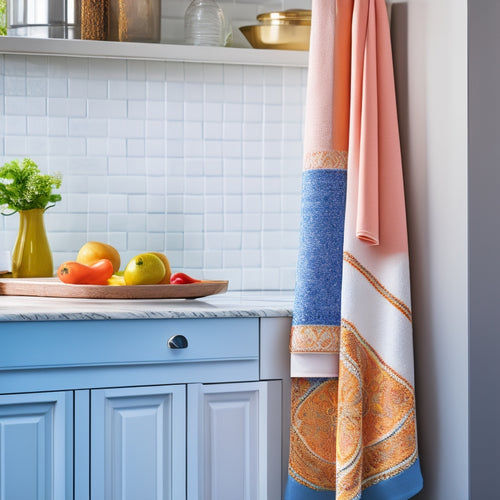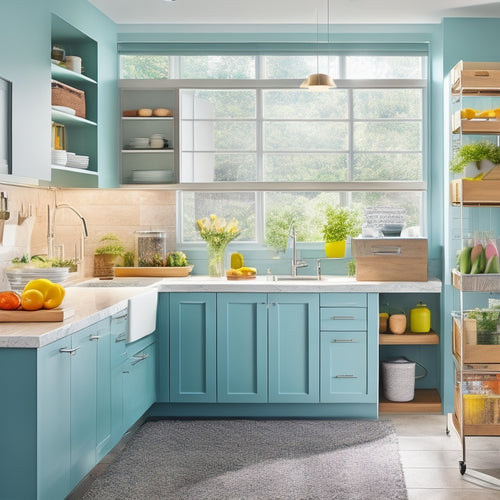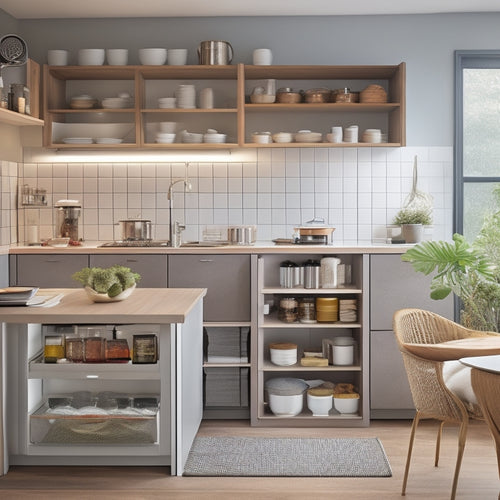
Keep Your Pets Safe: Food Storage Tips
Share
Proper pet food storage is vital for maintaining your pet's health and safety. Improper storage can lead to contamination, spoilage, and nutritional degradation, resulting in health problems like vomiting and diarrhea. To keep your pet safe, start by designating a clean and dedicated storage space, using airtight and moisture-proof containers, and labeling them properly. Store food in a cool, dry place and wash containers regularly to prevent contamination. By following these essential storage tips, you can guarantee your pet receives the necessary nutrients for best health. Learn how to further protect your pet's well-being by exploring safe storage practices and beyond.
Key Takeaways
• Store pet food in a clean, dry, and dedicated area to maintain nutritional value and safety.
• Use airtight, moisture-proof containers with proper labeling to prevent contamination and spoilage.
• Handle specialized diets with care, following manufacturer's guidelines and storing them separately to maintain potency.
• Report food-related issues promptly, stopping feeding suspect food and contacting a veterinarian if your pet becomes sick.
• Regularly wash and dry containers, utensils, and bowls to prevent cross-contamination and pet food hazards.
Food Storage Essentials
Proper storage of pet food and treats is crucial to maintaining the nutritional value and safety of the products, as it directly impacts the health and well-being of pets. Improper storage can lead to degradation of nutritional value, contamination, and spoilage, ultimately affecting the pet's health.
Proper storage guarantees that pet food and treats retain their nutritional value, aroma, and texture, providing pets with the necessary nutrients for peak health. Additionally, it helps prevent pets from overeating or eating food meant for another pet, reducing the risk of health problems like vomiting and diarrhea.
Safe Storage Practices
Effective pet food storage begins with a clean and dedicated space, ensuring that containers are free from contamination and moisture that can compromise the quality of the food.
When selecting storage container options, choose ones that are airtight, moisture-proof, and easy to clean.
Proper labeling techniques are also essential, as they enable you to easily identify the contents, including the type of food, date of purchase, and batch number. This information is crucial in case of product recalls or defects.
By following these safe storage practices, you can maintain the nutritional value of your pet's food and prevent health problems.
Remember to always store pet food in a cool, dry place below 80°F, and wash and dry containers between refills to prevent contamination.
Handling Specialized Diets
Specialized diets, such as those formulated for pets with food allergies or sensitivities, require extra care when it comes to storage and handling to maintain their potency and prevent contamination.
Effective specialized diets management involves storing these products in a dedicated area, away from other pet foods, to prevent cross-contamination. It is crucial to follow the manufacturer's guidelines for storage and handling to maintain the product's potency.
Dietary restrictions management is also crucial, as even small deviations from the recommended diet can have adverse effects on your pet's health. By following these guidelines, you can make sure your pet receives the nutrition they need while minimizing the risk of adverse reactions.
Reporting Food-Related Issues
Prompt identification and reporting of food-related issues are essential steps in ensuring the health and well-being of your pet. If you suspect a problem with your pet's food, stop feeding it immediately and contact your veterinarian if your pet becomes sick.
Report customer complaints and product recalls to both the FDA and the manufacturer, following the guidelines on the FDA's website. Identifying contaminants and ensuring quality control are vital in preventing harm to your pet.
Be vigilant and take immediate action if you notice any signs of contamination, such as foul odors or foreign objects. By reporting food-related issues promptly, you can help protect your pet and contribute to improved pet food safety standards.
Preventing Pet Food Hazards
Proper storage and handling of pet food and treats play a crucial role in preventing pet food hazards, which can have severe consequences for your pet's health.
Food safety is paramount, and improper storage can lead to contamination, spoilage, and even foodborne illness.
To prevent pet food hazards, it is necessary to maintain proper storage practices, such as storing food in a cool, dry place, using clean and dry containers, and washing utensils and bowls regularly.
By following these guidelines, pet owners can significantly lessen the risk of food-related health issues and safeguard their pets' well-being.
Frequently Asked Questions
Can I Store Pet Food and Treats in a Humid Basement or Garage?
Avoid storing pet food and treats in humid basements or garages, as moisture can compromise nutritional value and lead to spoilage, increasing the risk of foodborne illness and contamination; instead, opt for cool, dry storage areas below 80°F.
Are Plastic Storage Bins Safe for Storing Pet Food and Treats?
When it rains, it pours, and pet owners must prioritize food storage safety. Plastic bins may not be the best choice, as they can absorb odors and moisture. Opt for metal containers or airtight alternatives to preserve freshness and prevent contamination.
Can I Use Old Pet Food Containers to Store New Pet Food?
When reusing old pet food containers, guarantee thorough cleaning and drying to prevent bacteria growth and mold risk. Check expiration dates and freshness before refilling to sustain nutritional value and prevent contamination.
How Often Should I Clean My Pet's Food and Water Bowls?
Clean your pet's food and water bowls daily to prevent bacteria buildup, and sanitize them in a dishwasher safe cycle at least once a week to guarantee a hygienic feeding environment.
Can I Store Pet Food Near Cleaning Supplies or Chemicals?
As the ancient Greek physician Hippocrates once said, "Everything in excess is opposed to nature." Similarly, storing pet food near cleaning supplies or chemicals can be detrimental to your pet's health, as it can contaminate the food and alter its nutritional value, making proper food storage in a cool, dry place essential.
Related Posts
-

Over-The-Door Kitchen Towel Holder
An over-the-door kitchen towel holder is a smart way to maximize your space while keeping towels easy to grab. It hoo...
-

Sink Storage Solutions for Open-Concept Kitchens
To maximize storage in your open-concept kitchen, focus on clever under-sink solutions and vertical space utilization...
-

Space-Saving Kitchen Solutions for Busy Homeowners
To maximize your kitchen's potential, start with vertical storage solutions like wall-mounted shelves and pegboards f...


